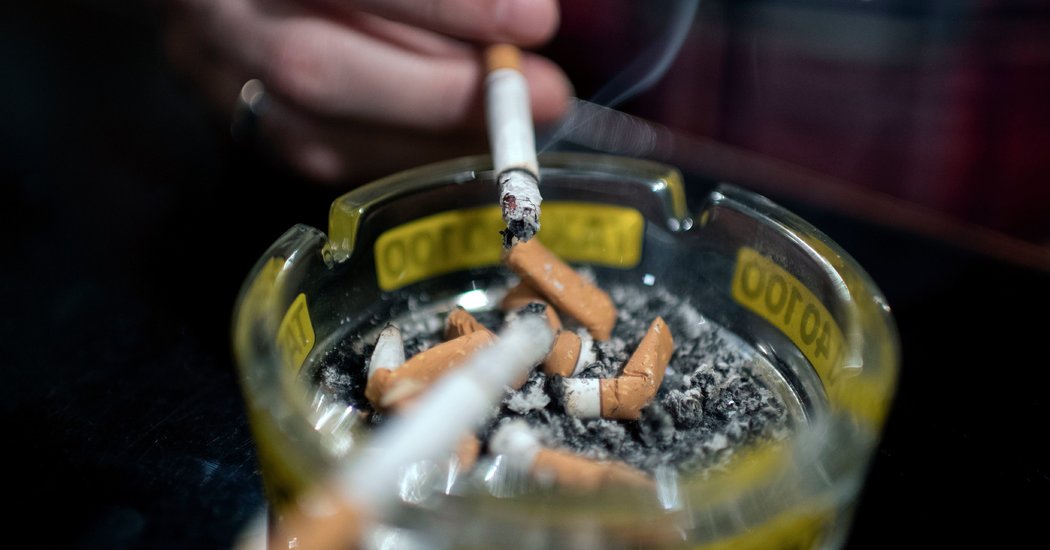
It goes without saying that cigarettes and surgery are not a winning combination. Scores of studies have shown that patients who use tobacco have poorer post-surgical outcomes. But many doctors give smokers conflicting advice on the ideal length of time they should go cold turkey before their operations.
A new report released this week by the World Health Organization seeks to provide some clarity. Patients who quit smoking at least four weeks before an operation, the study found, have substantially improved outcomes, with fewer post-surgical infections and a reduced probability that they will have to return to the hospital for additional care.
The authors of the W.H.O. report, which reviewed more than 100 studies on the subject, hope their findings will serve as a clarion call to the surgeons, anesthesiologists and hospital administrators who can play an outsized role in convincing patients to kick the habit, both temporarily and for good.
“For doctors around the world, surgery can be a teaching moment,” said Edouard Tursan D’Espaignet, a tobacco researcher at the University of Newcastle in Australia who collaborated on the W.H.O. study. “We are really encouraging entire health systems to take ownership of smoking cessation among their patients.”
There are more than a billion smokers globally, and one in 25 undergo major surgery each year, according to the W.H.O. In wealthier countries, as many as 16 percent of post-surgical patients develop severe complications; in the developing world, the post-surgery mortality rate can reach 10 percent depending on the country.
Studies have found that smokers who undergo surgery have more than double the rate of complications compared to nonsmokers, posing a significant burden on hospitals around the world. “Not only is it bad for the patient, but it’s bad for the distribution of health services because smokers are likely to be readmitted to the hospital, which potentially denies treatment to someone else,” Professor D’Espaignet said.
The authors of the report said the findings provided a powerful case for doctors to delay elective surgery for smokers to give them more time to quit. They found that patients who stopped smoking a month before surgery had fewer complications six weeks later, and that every tobacco-free week beyond those four weeks improved health outcomes by 19 percent.
The dangers of tobacco are widely understood, but few people appreciate the disadvantages that smokers face when recovering from a hip replacement, open-heart surgery or even a face lift. Smoking adversely affects cardiovascular function and the ability of tissues to heal. That’s because the carbon monoxide in cigarette smoke reduces the oxygen needed for normal cell function. Nicotine is also thought to stymie the clumping of the blood platelets that aid healing.
“Surgery itself is an assault on the body and your recovery is going to be that much harder if you smoke,” said Dr. Kerstin Schotte, a medical officer at the W.H.O. who works on tobacco control and helped write the report.
Many doctors say quitting is not always an easy sell. Dr. Amy Anne Lassig, a head and neck cancer surgeon at Hennepin Healthcare in Minnesota, said about half of her patients continue smoking even after their cancer diagnosis. “Some are able to quit cold turkey but for other patients, it’s such a stressful moment in their life that many feel hopeless, go in the other direction and keep smoking,” she said.
But imminent surgery, she said, can be a powerful incentive for some patients, and Dr. Lassig tries to encourage smokers to quit by highlighting their improved chances for recovery.
“People really do take that to heart, and they appreciate that I’m honest with them,” she said. “Unfortunately, not everyone is able to put my advice into practice.”
The W.H.O. says hospitals should play a greater role in helping smokers quit. Because most health care facilities prohibit tobacco use — forcing even the most ardent smokers to give up while hospitalized — surgeons and anesthesiologists are being urged to leverage the moment and help surgical patients quit for good. Although many hospitals in the developed world have in-house tobacco cessation programs, they are less common in poorer countries.
Dr. Nancy Rigotti, who directs the Tobacco Research and Treatment Center at Massachusetts General Hospital, said more than half of all smokers admitted to the hospital receive nicotine replacement therapy, up from just five percent 20 years ago. Discharged patients are sent home with nicotine patches, and the center’s employees follow up with calls and texts to encourage their compliance.
But there is nothing like an impending surgery to get smokers to kick the habit for good. “When you’re facing the idea of having general anesthesia and having your chest cracked open, most people will do whatever they can to have a good outcome,” she said. “What we’ve found is that illness is a teachable moment for unhealthy behaviors.”

